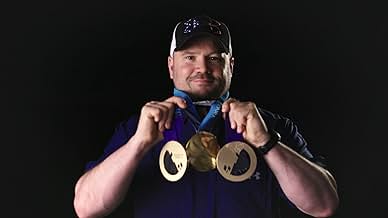A look at the mental health challenges Olympic athletes often face.A look at the mental health challenges Olympic athletes often face.A look at the mental health challenges Olympic athletes often face.
- Director
- Writers
- All cast & crew
- Production, box office & more at IMDbPro
Featured reviews
It is clear that Phelps was roped in to headline this because of his name & status. As a swimming enthusiast myself, and having followed the lives & progress of swimmers of the London & Rio Olympics, I thought Allison Schmitt's depression story should have been included. It would make a very compelling tell.
The athletes interviews were uneven imho. Some were diplomatic. Lolo Jones' segments gave me the deepest impression. Her accounts were raw, eye-opening and had you wanting more.
It's clear we have some issues with our Olympic athletes and their mental health, this documentary clearly shows that. I wish we had seen if this was a global issue and also have there been changes made to help our USA athletes? There seems to be some but it wasn't clearly addressed in the documentary.
This may be the dooropener that every athlete in the world that every athlete should have or should have had in their years of active sporting. its a documentary on mental health issues in the top level of executing sports on top level, or olympian level, or as the layman journalist often say'' the proffesionals'' in sporting, and how life turns out when stepping down or retirement from the sport is a fact.
and the fact is that many people really hits headless into a brick wall when everyday life begins. ive been doing swimming, on a pretty tough level nationally with 22-30 hours of practice pr week, and i was far from talented and not birthgiven the genes and bodytype to become a great swimmer, but i did do it. when i quit swimming due to studies and work to make a living i didnt become depressed, but i lost a lot of friends, and became extremely introvert and more and more isolated due to that, loosing confidence, and as time went by i became more frustrated and despaired than depressed.
my conclusion have, as years have passed by, is that athletes, especially athletes on top level in individual sports are extremely nerdy, maybe the nerdiest of all humankind, and to be nerdy is often caused by some kind of latent mental health issues. im an old grumpy man today, married with children and grandchildren, none doing sports, actually they hate the thought of competing(maybe from their mothers side). but these day when children are detected by the environment of kindergarden and schools showing signs of , and /or being diagnosed with mental health issues, i have concluded and have been supported by school mates and sports friends in later years that i must've been an ad/hd'er and extreme OCD'er when growing up, keeping my symptoms under cotrol by practicing till fatigue made me sleep, and my life was completely automatized into wake up,eat train,school, eat, train, homework ,eat and sleep in a neverending clockwork of never letting the guards down. so imagine was i the only one being like that??
i guess serious athletes do have a loose screw inside ones temples, and should really be taken cared of and asked by their coaches and surroundings, how do you do today, every day as long as sports are the only thing that matters in life. mental readyness for later life experiences can be better managed if talked over during the active years.
its a good and comprehensive documentary, that actually couldve been even better if based on more factual findings, but the stories told by phelps and others are gutwrenching, and almost had me crying when viewing.so R.I.P to those who couldnt manage life anymore, and take care to all the rest of the worlds retiree's thats still alive and kicking. its a big grumpy recommend.
and the fact is that many people really hits headless into a brick wall when everyday life begins. ive been doing swimming, on a pretty tough level nationally with 22-30 hours of practice pr week, and i was far from talented and not birthgiven the genes and bodytype to become a great swimmer, but i did do it. when i quit swimming due to studies and work to make a living i didnt become depressed, but i lost a lot of friends, and became extremely introvert and more and more isolated due to that, loosing confidence, and as time went by i became more frustrated and despaired than depressed.
my conclusion have, as years have passed by, is that athletes, especially athletes on top level in individual sports are extremely nerdy, maybe the nerdiest of all humankind, and to be nerdy is often caused by some kind of latent mental health issues. im an old grumpy man today, married with children and grandchildren, none doing sports, actually they hate the thought of competing(maybe from their mothers side). but these day when children are detected by the environment of kindergarden and schools showing signs of , and /or being diagnosed with mental health issues, i have concluded and have been supported by school mates and sports friends in later years that i must've been an ad/hd'er and extreme OCD'er when growing up, keeping my symptoms under cotrol by practicing till fatigue made me sleep, and my life was completely automatized into wake up,eat train,school, eat, train, homework ,eat and sleep in a neverending clockwork of never letting the guards down. so imagine was i the only one being like that??
i guess serious athletes do have a loose screw inside ones temples, and should really be taken cared of and asked by their coaches and surroundings, how do you do today, every day as long as sports are the only thing that matters in life. mental readyness for later life experiences can be better managed if talked over during the active years.
its a good and comprehensive documentary, that actually couldve been even better if based on more factual findings, but the stories told by phelps and others are gutwrenching, and almost had me crying when viewing.so R.I.P to those who couldnt manage life anymore, and take care to all the rest of the worlds retiree's thats still alive and kicking. its a big grumpy recommend.
'The Weight of Gold' (2020) is a highly personal and gut-wrenching documentary covering a topic that is everywhere and rarely acknowledged in sports, mental health.
This film focuses on Olympians and their personal experiences and battles with mental health. I disagree with some other reviewers in that this film does not not say other highly successful individuals not in the Olympics do not suffer as bad or that Olympians suffer worse than anyone else. This documentary is made by Olympians to help shed some light on their own struggles, and is being made for future Olympians to help them with their own journeys as they chase their dream.
Narration and personal stories bring forth the widespread challenges members of the U. S. Olympic team face in their lives. Some have more sponsorships and post-Olympic opportunities while others do not.
This film can be tough for the viewer especially if they or someone they know has struggled with their mental health. And even in this film, Steven Holcomb, who speaks of his own personal experiences with other athletes ends up losing his own battle while this film is still being made.
This film is tragic and at times tough to watch if you can understand their mindsets. Since its release there has been progress made as Covid-19 has pushed mental health into the spotlight more but hopefully this film can at the very least serve as a teaching tool for all past, current, and future Olympic athletes regardless of their nation.
This film focuses on Olympians and their personal experiences and battles with mental health. I disagree with some other reviewers in that this film does not not say other highly successful individuals not in the Olympics do not suffer as bad or that Olympians suffer worse than anyone else. This documentary is made by Olympians to help shed some light on their own struggles, and is being made for future Olympians to help them with their own journeys as they chase their dream.
Narration and personal stories bring forth the widespread challenges members of the U. S. Olympic team face in their lives. Some have more sponsorships and post-Olympic opportunities while others do not.
This film can be tough for the viewer especially if they or someone they know has struggled with their mental health. And even in this film, Steven Holcomb, who speaks of his own personal experiences with other athletes ends up losing his own battle while this film is still being made.
This film is tragic and at times tough to watch if you can understand their mindsets. Since its release there has been progress made as Covid-19 has pushed mental health into the spotlight more but hopefully this film can at the very least serve as a teaching tool for all past, current, and future Olympic athletes regardless of their nation.
- How long is The Weight of Gold?Powered by Alexa
Details
- Release date
- Country of origin
- Official site
- Language
- Also known as
- Altının Ağırlığı
- Production company
- See more company credits at IMDbPro
- Runtime1 hour
- Color
Contribute to this page
Suggest an edit or add missing content


























